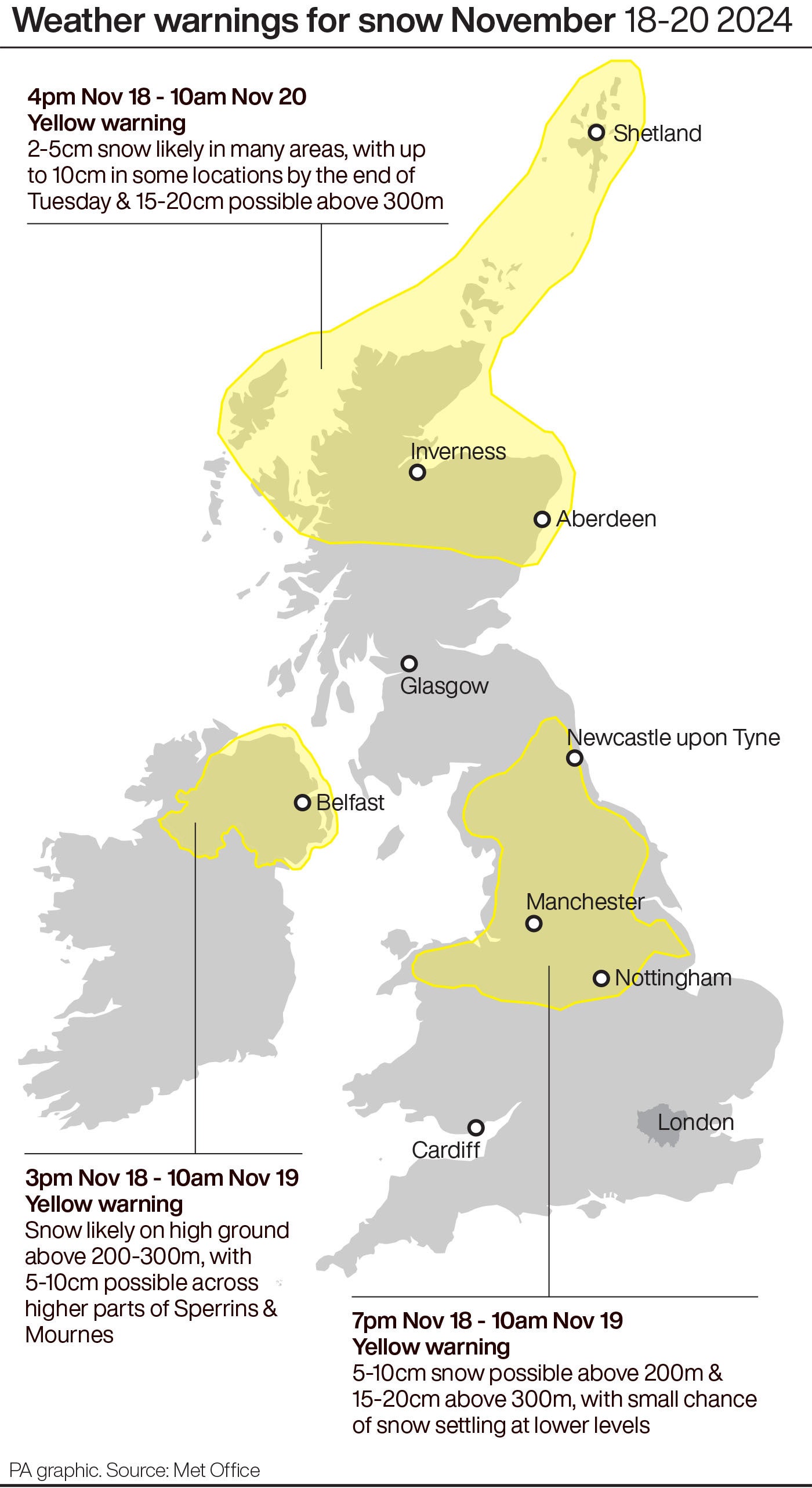
Snow has fallen across parts of the UK after the coldest night of the season so far.
Temperatures dropped to minus 7.8C in Tulloch Bridge, Scotland, in the early hours of Monday, which is the lowest temperature the UK has seen since last winter.
Cold temperatures, ice and further snow feature on the forecast for the coming days in what the Met Office deemed is the country’s “first taste of winter”.
The UK Health Security Agency (UKHSA) issued the first amber cold weather health alert of the season and, along with charity Age UK, warned that the conditions could be dangerous for vulnerable people, including the elderly.
The amber warning covers the east and north of England, midlands, and Yorkshire and the Humber, with yellow alerts coming into place for the South East, South West and London at 8am on Tuesday, lasting until 6pm on Saturday.

Dr Agostinho Sousa, from the UKHSA, said: “This is the first amber Cold Weather Health Alert of the season, but we can expect more as we approach winter, and it is vital to check in on vulnerable friends, family and neighbours to ensure they are well prepared for the onset of cold weather. Particularly if they are elderly or otherwise at increased risk.”
Charity director Caroline Abrahams said: “With the Met Office issuing a yellow weather warning of snow and ice in some areas this week we are especially worried – the loss of the Winter Fuel Payment has caused many older people to be extra fearful about turning on their heating this winter.
The cold raises blood pressure, which in turn increases the risk of a heart attack or stroke and breathing in cold air can also increase the risk, and impact, of serious illnesses like flu and pneumonia
“With high energy bills and food prices it is understandable that some may think they have to cut back on food and turn their heating off, but prolonged exposure to cold temperatures can have a serious impact on an older person’s health, especially if they are already trying to manage existing illnesses.
“The cold raises blood pressure, which in turn increases the risk of a heart attack or stroke and breathing in cold air can also increase the risk, and impact, of serious illnesses like flu and pneumonia.”
Ms Abrahams said it is “vital” that older people stay “fit, warm and well if they can” by having hot food and drinks throughout the day, wrapping up warm and sleeping with the windows closed.
Snow dusted grounds across Scotland, including at the Glenshee Ski Centre near Braemar and at Corgarff, both in Aberdeenshire, as well as alongside the A939 near The Lecht in the Cairngorms.

Snow also blanketed the mountain of Ingleborough, while frost covered berries in bushes near Clapham, in the Yorkshire Dales.
Met Office spokesperson Nicola Maxey said snow has mostly fallen on hilltops so far on Monday – with 2cm falling in Lerwick, Shetland.
But more snow and ice is expected over the coming days, with temperatures plunging to below average levels for the time of year.
“It is going to be quite a widely cold week,” Ms Maxey said. “A few degrees below average both day and night for most of the country.”

It is predicted temperatures could drop to minus 2C in London on Friday, minus 4C in Birmingham and minus 7C further north.
There is a possibility of 15-20cm (around 6-7.8in) of snow on ground above 300m (984ft), 5-10cm (around 2-4in) in areas higher than 200m (656ft), with a “chance” that snow could hit lower levels and cause road disruption – although the likelihood of that remains “uncertain”.
“There’s likely to be a widespread frost overnight as we get this colder air coming in from the arctic maritime air mass – cold air from the north pushing down across the country – which will be across the whole country by the middle of the week,” Ms Maxey said.
The Met Office issued several yellow weather warnings for snow and ice for parts of the UK and will likely issue further alerts.

On Monday, a warning comes into force at 3pm and is in place until 10am on Tuesday covering Northern Ireland.
Another yellow alert comes into effect at 4pm and is in place until 10am on Wednesday, covering areas in Scotland, and a third goes live at 7pm and lasts until 10am on Tuesday covering areas in the East Midlands, Yorkshire and the north of England.
Within affected areas, there is a chance of power cuts, disruption to road and public transport and the risk of injury from slipping on ice.







